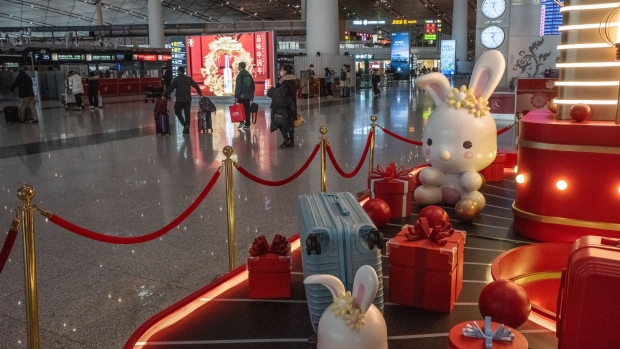Jan 18, 2023
Chinese Travel Rebound May Take Months Amid Hurdles to Flights
, Bloomberg News

(Bloomberg) -- Travel from China may need another four months to show a significant increase, despite the country just recently dropping Covid-related curbs on foreign trips.
Overseas journeys from the Asian nation are unlikely to ramp up before the second quarter, most probably from the national Labor Day holiday on May 1, according to aviation data provider OAG.
Chinese travelers made 155 million trips abroad in 2019 and spent almost $255 billion, amounting to 14% of global tourism revenue. A return to those levels will be held back by a number of factors, OAG Chief Analyst John Grant predicted Wednesday, including the current Covid wave in the country, the relative weakening of the economy, and global increases in ticket prices.
More than 50 million Chinese citizens have likely also seen their passports lapse, while foreign airlines will struggle to immediately respond to the reopening, having committed capacity to other markets for the coming summer, Grant said in a webinar on the likely impact of the reopening.
“We’ve been waiting for this for so long, but now it’s happened it’s a bit of a damp squib,” he said. “It’s a lot more complex than we originally thought.”
Airline capacity between China and countries in Northeast and Southeast Asia may be fully restored within six months, OAG predicts, with the most-searched-for destinations currently including Singapore, Bangkok, Tokyo and Seoul.
However, Grant said the rebound will take far longer for routes to Europe and North America, perhaps as long as 18 months. Some markets could see an enduring contraction in light of the current economic outlook.
The ongoing closure of Russian airspace to West European carriers following the invasion of Ukraine continues to represent a major obstacle to services, with airlines facing a two-hour detour that can render flights uneconomic and potentially clash with available landing slots even when services are viable.
For Chinese airlines, the relaxing of curbs has unleashed wider domestic travel in time or the start of the lunar new year at the weekend, Grant said. The 40-day New Year period that began on Jan. 7 represents the largest annual migration on earth, with 2 billion journeys.
For European flights, China’s carriers are also unaffected by airspace restrictions, while jet-leasing firm Avolon Holdings Ltd. said this week that its aircraft fleet needs little preparation to expand operations, with groundings and staff layoffs having been largely avoided as domestic services were maintained during the pandemic.
©2023 Bloomberg L.P.


